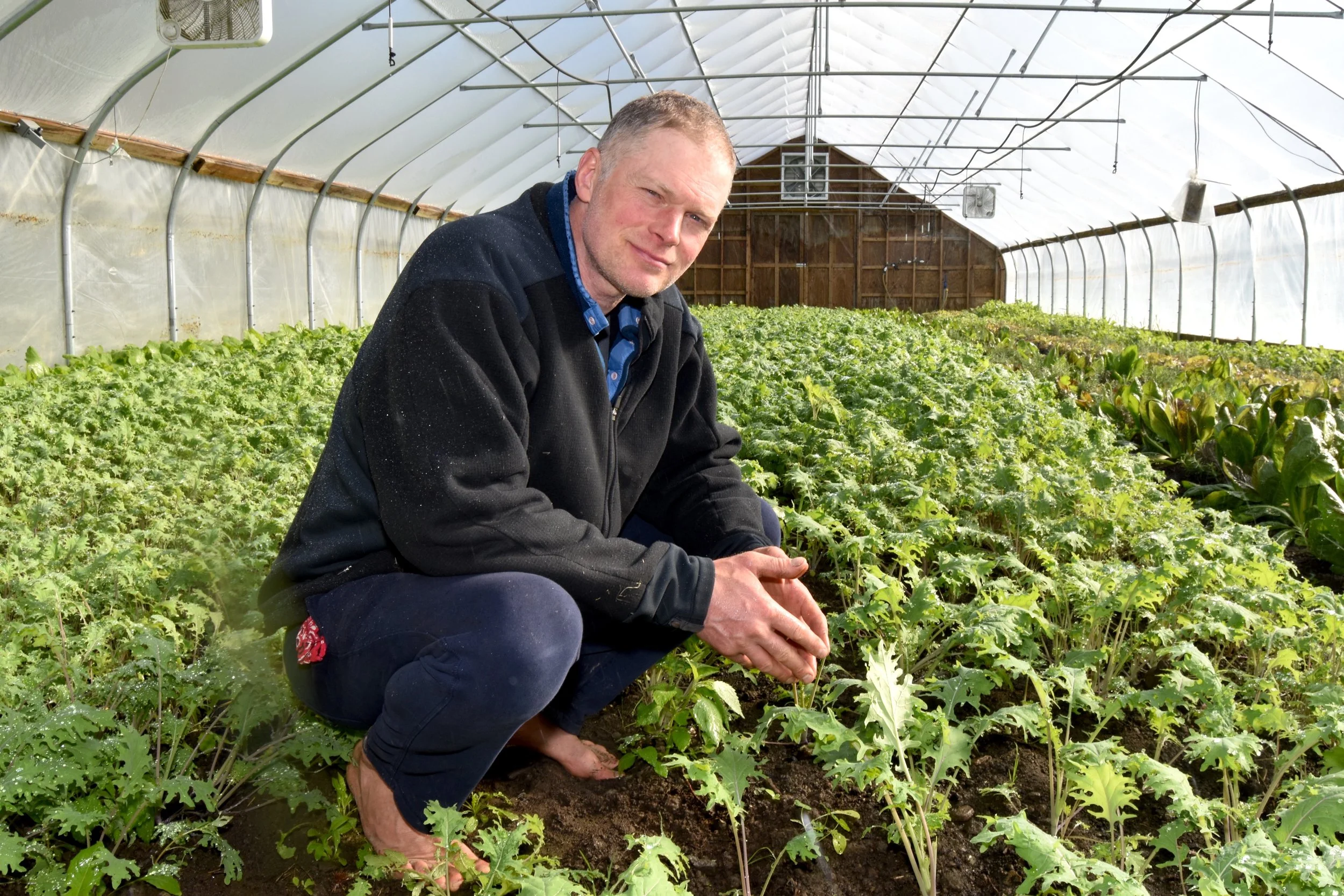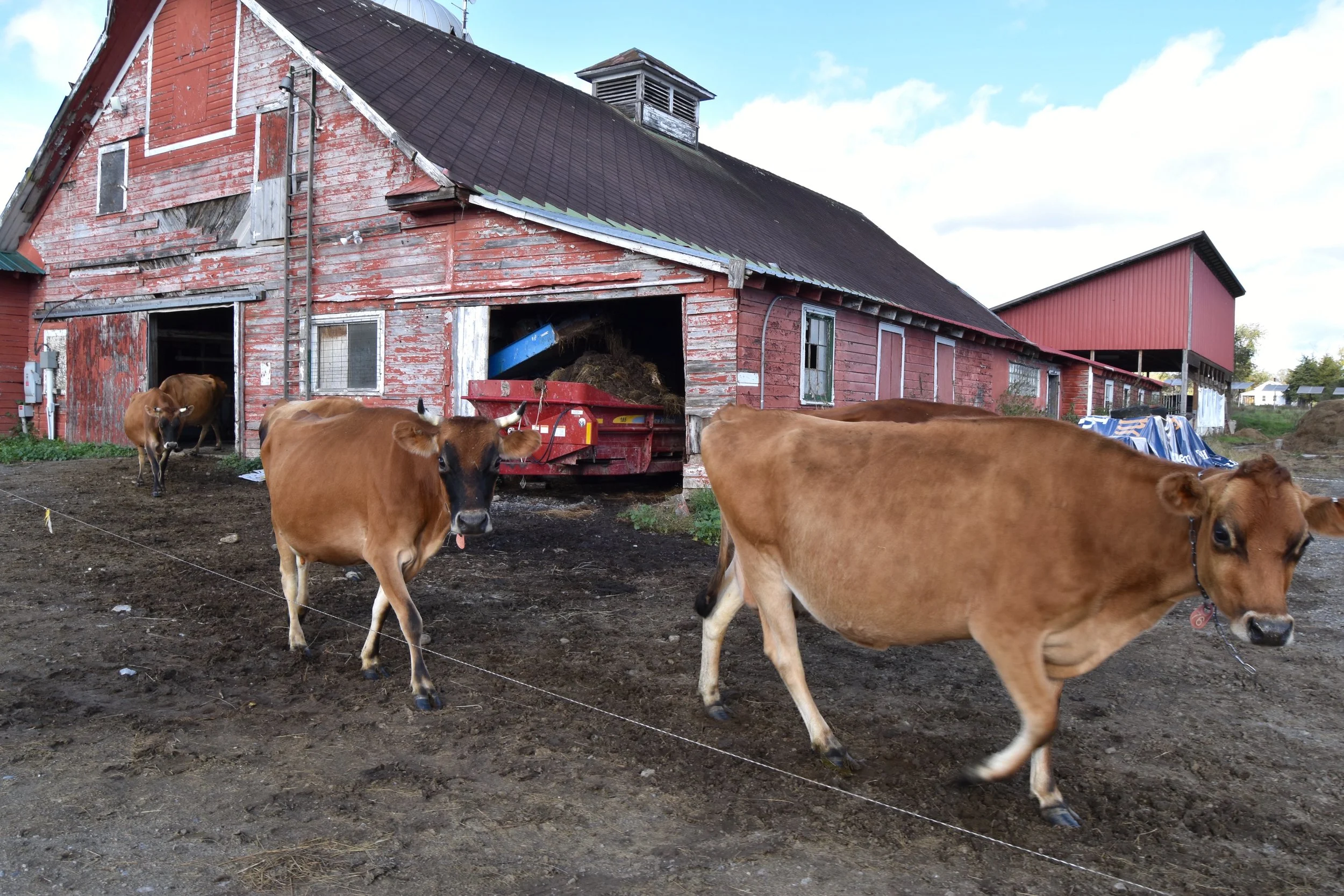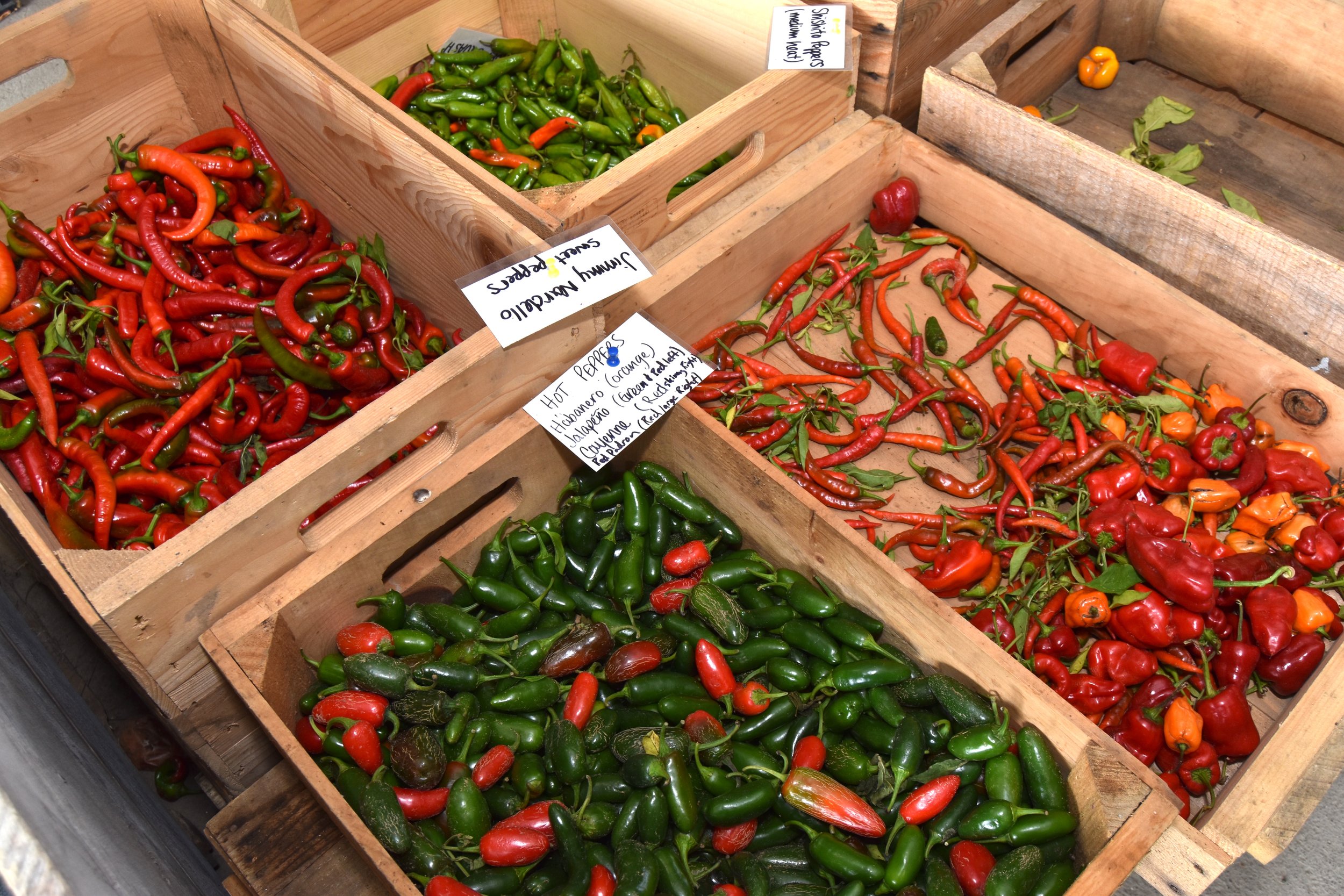This Farm Offers An Organic Diet for a Single, Low Price that’s Cheaper than McDonald’s
With a generous invitation, an unconventional New York CSA farm is decoupling income from price per pound
Mark Kimball of Essex Farm, an unconventional CSA in Upstate New York. Photo: Nina Roberts
Published on TheTimes of Entrepreneurship on November 22, 2021
Roll into Essex Farm, located a mile west of Lake Champlain in the Adirondacks, and the usual sights, sounds and smells of a working farm emerge. Weathered wood barns, rolls of hay, workers in rubber boots escorting cows to pasture, rows upon rows of green leafy tufts, rusty farm equipment graveyards and a massive pile of dark brown future mulch made from farm scraps, including a random spine, stark white in contrast.
Mark and Kristin Kimball started Essex Farm in 2003 on 500 acres. It’s more than doubled in size since. While it might appear to be a conventional farm, with its picturesque silo, fields, chickens, goats, and fluffy Great Pyrenees dogs, its ethos is anything but.
The Kimballs designed Essex Farm as a year-round, full-diet CSA with a pricing scheme that’s mind-boggling for the average US consumer. Local members pay $85 a week and can take all the meat, vegetables, dairy, grains, eggs they need for a week of eating. At roughly $4 a meal, it’s inexpensive. More revolutionary from a business perspective: The farm’s business model decouples price from quantity, a rare move in an industry, agriculture, that is usually structured to produce commodities.
Mark Kimball, tall, blond and often barefoot, grew up until age 10 on a homestead experiment of sorts with his family. His professional parents had a “Scott and Helen Nearing, back to the land, energy,” as he puts it, referring to the famous couple who left city life for Vermont in the early 1930’s. Mark Kimball had already been training on CSA farms for eight years prior to landing in Essex. However, farming was a radical lifestyle change for Kristin Kimball. She’d been living in New York City after graduating from Harvard University, and working as a writer and journalist. She chronicled the change in her book, The Dirty Life, about the early farm years.
Cows going leaving the barn at Essex Farm. Photo: Nina Roberts
Surrounded by majestic mountains and dotted with soaring trees, Essex Farm also has utilitarian trailers and a central open air building where their CSA (Community Supported Agriculture) members gather their food for the week. The bins, creates, shelves and refrigerators were recently stocked with two types of eggplants, garlic, sausages, chicken, Delicata squash, multiple peppers in rich reds, oranges and greens, among other offerings.
Mark Kimball took a break from preparing the ground for garlic planting to speak with the Times of Entrepreneurship.
Nina Roberts: So, from the start, your idea was to offer a full-diet CSA with meat, vegetables, dairy, etc. Is that the norm or considered extreme?
Mark Kimball: Most of the farms I know are trying to create a homogeneous product. The whole American system is working towards making one product well, for a profit. We didn’t do that.
NR: How did friends, family, mentors react to the idea of an all-diet CSA when you began Essex Farm?
MK: Everyone was sort of like, “Go for it.” Then we got up here and I think anybody who had seen a hippie, organic farm was sort of like, “Yeah, they’ll never make it.” Some people said, “I hope it works,” but most people in the community were kind of like, “Mmmm, I doubt it.” One person said directly, “You’re going to fail,” and many people indirectly.
NR: Your pricing is quite unique. Members pay a weekly flat fee and can take as much as they need to eat for a week? Is this common among CSAs?
MK: I would guess there are less than a dozen CSAs across the country that have a one price and members can take as much or as little as they like. I don’t think there’s that many people doing it on a sort of small business scale. It hasn’t caught on, it’s not like, “Oh, this is the next paradigm.”
The business model is: take what you need this week. And then at any given time, if there’s something we’re short on, we’ll say there’s a limit, “There’s 75 families picking up today, so each of you can have one zucchini.”
Hay rolls at Essex Farm. Photo: Nina Roberts
NR: I’m assuming that pricing is only available to your local members, since they are physically going through all the bins, not those ordering online for delivery.
MK: Online it’s the same. They go down the list [online], there are no prices.
NR: The $85 per week cost is a bit pricey for the average local person. Do you feel it’s fair?
MK: Locally, it’s $4 a meal—for grass fed and organic—that feels like the best discount you could ever get. To be able to get 21 meals for $85, plus snacks and feed any friend who happens to be coming by, I think it’s probably one of the lowest priced food options in America, period. You can’t go to McDonalds for that.
The price goes up quickly if you’re not dependent on the food, as your food. Some members might eat out, or go on vacation, but still pay anyway. And then there are people who order seven times what everybody else does—every single meal comes from here, period, done, there’s nothing else that they buy.
NR: Did anyone think you would go out of business with that flat fee pricing model?
MK: Oh yeah, I think everyone. That’s not how we buy food in America. Most new members ask us, “Won’t somebody abuse it?” Each year there’s been one or two people that are probably feeding a couple of extra mouths. But far and away, 99 point blank percent of the members are doing it to support us.
We’re not trying to set up parity, we’re trying to set up an invitation for generosity. And in that context, I think very few people are abusing the honor of being part of this.
A selection of peppers at Essex Farm. Photo: Nina Roberts
A number of new members who are sort of, super OCD, ask, “How much should I take?” And say, “You’ve invested in us, take what you can eat.” Then they might ask, “What if I have friends coming over?” With some people, it does take a little while, until they understand that this farm is more about crazy, beautiful, chaos than it is about a prescribed recipe.
NR: Why not just price by the pound or per item?
MK: The idea of decoupling farmer income from price per pound, is still one of the most satisfying ways to do agriculture. I don’t look at a crop from a cash value perspective, I look at it from “Does this feed our members, and us, in a way that gives us health?”
If you are trying to set up a demonetized system of agricultural success, then you want members to take what feels good to their bodies. And on the agricultural side, it’s not looking at every process we do on the farm as a dollars-per-hour.
Basically, redefining efficiency in favor of health, would be my answer.
NR: And are you making a profit?
MK: We’ve been marginally profitable for every year. I mean, there’s ups and downs. But if you look at the average, we’re showing an average of probably $10,000 to $50,000 profit every year. Ninety-five to 98 percent of our sales each year is from the initial dream of feeding ourselves, our farmers, and our community with a whole food, beyond organic diet. About 330 people get something from the farm each week, roughly 2/3 pick up at the farm and 1/3 we deliver.
But there’s still a lot of jaw-dropping chaos. I don’t think we fall into the “American entrepreneurial story,” I think we fall into the “idealistic, determined, creative, passionate, community-farmer-paradigm-of-some-sort, story.”
NR: Many of your former employees or volunteers have gone on to start their own farms, Essex Farm is like a “farm incubator,” I know that’s not what you call it, but…
MK: I think that’s a fair term. How do we train the next generation?
NR: There’s Reber Rock Farm, Mace Chasm Farm, North Country Creamery…
MK: There are hundreds of people who have worked here and are still farming. We’re still giving young, old and new farmers, full responsibility to basically empower them in an agricultural community.
NR: So “farm incubator” is accurate.
MK: We’re not the iconoclastic, self-made, “How I Built This,” on NPR, we’re the opposite. We’re sort of, “How We Haven’t Quite Figured This Out,” the “we” is all of us, not just me and Kristin. It’s every single person that has been meaningfully involved. And I think everyone rightfully has felt that without their involvement, we would be less.
There wasn’t an inflection point where suddenly the public caught on and just flooded us with orders. An all-diet, year-round CSA, our pricing, is such a big shift on so many levels that we still haven’t figured out how to sell it, obviously, otherwise, we would have grown a lot more.
Seventeen years in, we haven’t moved out of startup. Most companies either go bankrupt or get successful, and we’ve sort of grown [laughs] organically.
This Q&A had been edited and condensed for clarity.



